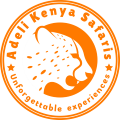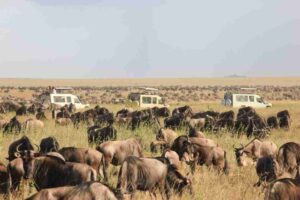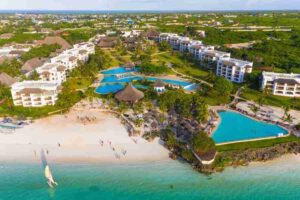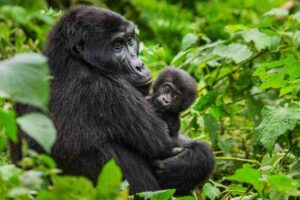| Name of the facility | Mara Plains Camp |
|---|---|
| Certification Achieved | Gold |
| Year opened | 2010 |
| Tourism region | Masai Mara/South Rift |
| County | Narok |
| Address | Head Office – Nairobi Map It |
| Telephone/Mobile | +254 (0)733 511 941 |
| dws@africaonline.co.ke | |
| Website | greatplainsconservation.com |
| Facility Notes | Mara Plains Camp is located in Olare Motorogi Conservancy situated within the Mara-Serengeti Ecosystem. The camp lies on Global Positioning System (GPS) Latitude: S01020.609’ and Longitude: E 035007.813. It was established in 2010, owned and managed by Great Plains Conservation. It has seven (7) tents with a maximum bed capacity of 14. The camp is open all year round and has 35 permanent staff for its operations. It is designed to have a low impact on the environment. The canvas tents are beige in color, and blend in with the natural surroundings. They are raised from the ground on wooden platforms, leaving the natural vegetation relatively undisturbed. The Olare Orok Conservancy was established in 2006 and later expanded to encompass Motorogi lands, thereby becoming Olare Motorogi Conservancy. It measures approximately 14,164 hectares (approximately 35,000 acres) wildlife conservancy, and lies within the Koiyaki Group Ranch, between Olare Orok River and Talek – Aitong Road. It shares the Southern boundary with Masai Mara National Reserve; and Naboisho Conservancy to the east providing critical wildlife dispersal area for migratory wildlife, including the wildebeest and other herbivores. It has significant populations of a wide variety of wildlife, wildebeest, Zebras, Thompson’s Gazelle, Impala, elephants, giraffes, spotted Hyena, jackals, warthogs, leopards, cheetah and lions. |
| Energy management | The facility’s main source of power is solar energy fixed with power inverter battery system. The system provides power for lighting and running all the refrigerators. It is fixed with 72 solar panels. The solar power inverter system is metered and installed with main switches for major outlets which enable easier energy monitoring. For water heating purposes, the guest tents are each fixed with a 300 litre solar water heating system. In addition are seven (7) back up kuni boilers. Energy saving LED and energy saving bulbs are fitted for lighting throughout the camp. Solar power rechargeable flash light torches are used by, guests and security officers within the camp Guests and staff are briefed on energy conservation and efficiency through guests’ arrival briefings. |
| Environmental management | Mara Plains Camp is guided by its corporate motto ‘conserving and expanding natural habitats’ which is implemented through the facility policy; to create iconic role model conservation projects that ensure local communities benefit from protecting their environment and natural heritage. The facility has a comprehensive environmental management system with clear action / management plans for water, energy and solid & liquid waste management. The camp undertakes its annual self-environmental Audit (EA) as required by legislation. |
| Chemical use | The camp uses environmental friendly detergents for laundry purposes. Staffs handling chemicals are trained on usage. Biodegradable bathing soaps and solutions are used within the camp. LPG (Liquefied Petroleum gas) is packed in 25 kg and 50 kg gas cylinders used for guests and staff cooking respectively. Fuel (diesel) is stored in 200 litres reservoirs whereas paraffin is bought in 20litre containers. |
| Conservation Criteria | |
| Community Criteria | |
| Solid waste management | Waste separation is conducted at source, and the bins are clearly labeled. Additionally, further sorting is done at the waste management center. The waste is also weighed and recorded for monitoring purposes. Organic waste is managed through a compost pit which is well enclosed to keep off scavengers while plastic, glass and metallic waste is later disposed via Mara Plains head offices to recycling companies in Nairobi. The facility employs the 3Rs waste management principle. .It uses rechargeable solar torches as a measure to avoid cell-battery waste generation. Drinking water is bought in 18 liters re-usable containers and served to guests in glass jugs so as to reduce on plastic waste. |
| Water management | The Main source of water for the camp is from a borehole located within the camp. The water is stored in reservoir tanks with an average capacity of 15,000 litres. Additionally, the camp harvests rain water from its iron roofed staff quarters. The water is stored in three (3) tanks with a capacity of 15,000 liters. The water is metered at the main outlets (three meters are installed) and recording done on daily basis for monitoring purposes. Drip irrigation has been installed on the facility kitchen garden as a measure to reduce on water consumption while the guest kitchen is fitted with push taps to reduce on water usage. In addition, the guest tents toilets have been adjusted to reduce on the amount of water consumed per flush. Guests are sensitized on water conservation efforts by the camp manager upon arrival and through tent information folders. There are also “towel talk” signs in the guest tents encouraging guests to re-use their towels to reduce on water usage. |
| Visitor communication & education | On arrival guests are briefed upon arrival on the values of the camp, camp operations and the Conservancy. Mara Plains Camp has a visitors’ resource area (located at the main tent) equipped with reading materials including environmental publications, wildlife and travel magazines, and nature conservation magazines such as Africa Geographic, Books on Kenya, Birds of Kenya. Mammals and bird list to sensitize visitors on the environmental values, and conservancy operations and activities. Booklets and room information folders are available at the resource information section and guest tents respectively. Information on wildlife conservation projects such as Mara Cheetah and Mara Predator is shared with the guests. Booklets information sheets are available at the resource information section and guest tents respectively. |
| Pollution | Paraffin Lanterns are used to light the paths at night with an aim to reduce light pollution. The facility has a 16KvA generator (rarely used) which is well insulated and soundproofed. |
| Environmental conservation | Mara Plains Camp is built on low environmental footprint and blends in with the local surrounding. The premises are unfenced allowing wildlife to move freely. Guest tents are made of beige canvas raised on raised wooden platforms (obtained sustainably – recycled from old rail sleepers). The pathways are demarcated by use of mazera stones. The staff quarters are made from recycled tetra pack material and blends well with the surrounding. Guests are encouraged to engage in low impact activities such as village visits, bird watching and nature walks. Mara Plains Camp partners with the conservancy on wildlife monitoring initiatives; this include Mara Predator Project – an initiative to build an identification database of lions in and around the conservancies north of the Masai Mara National Reserve through tracking individuals and Mara Cheetah Project – a research initiative headed by Dr. Elena to identify the behavioral adaptations and assessment of impact of social structure on reproductive success and survival of the cheetah in the protected areas. The partnership includes data collection through guides and visitors. In addition, the clients are offered sensitization and conservation talks by the project researcher. The camp guides assist the conservancy rangers in wildlife monitoring and report on any incidences to the conservancy. Mara Plains has an environmental sensitization program at the local Endoinyo Erinka Primary school. Achievements include, setting up an environmental club, tree planting and motivational game drives and talks by camp guides at the school. |
| Waste water management | Effluent from the guest and staff kitchen flows through a grease trap to filter out oils and grease before draining into a bio box treatment system. Grey and black effluent from the laundry, guest tents, public areas, and staff quarters is managed through Biobox treatment system. The Biobox system ensures the waste water is recycled through treatment. The treated waste water is used for irrigation in the kitchen garden Water effluent sample tests are conducted in compliance with Environmental Management and Coordination (Water Quality) Regulations of 2006. |
| Purchasing and supplies | Food for staff and guest is bought in bulk to reduce on packaging. Fruits and vegetables are packed in re-usable crates whereas meat is stored in a cold room. |
| Employment and remuneration/staff welfare | There is a staff welfare committee which handles and addresses staff issues to the management. |
| Staff education, communication and awareness training | The camp has in house trainings for its staff. Topics trained on include food preparation, hygiene, food safety, health and safety work skills development, and general knowledge improvement. The facility chefs are sent for refresher course trainings at Kenya Utalii College. Mara Plains camp has notice boards fixed within for staff communication. Employees are sensitized and briefed during departmental/daily meetings. |
| Cultural preservation and promotion/protection of local sites | The camp offers village visits for an authentic cultural experience at local Elndoinya Erinka Village. A community women group (consisting of 100 members) has been selected where visitors are taken at individual homesteads for cultural experience. Guests only purchase curios and beads at the women’s group shop. For village visits, visitors pay 10 USD to Elndoinya Erinka women group kitty. In addition, the facility has a curio shop which sells few beadwork obtained from Endoinya Erinka women group. |
| Benefits to local community/community empowerment | The Mara Plains camp purchases from the local Talek town where possible. Products such as staff food mostly flour, and sugar, vegetables and fruits is bought locally. The facility further employs from the local community. Approximately 80% of the staff is from the local Masai community. The conservancy pools together, the bed night fees, and conservancy fees from members camps. The monies are paid for the conservancy management and operations, and lease fee to individual land owners. Major projects such as education, infrastructure and community wellbeing initiatives are implemented. Through Mara plains and the conservancy Trust, the following initiatives on health, education, and community wellbeing are implemented. Below are some of the major initiatives: • Health: construction of a health clinic at Eldoinyo Erinka. • Education: donation of learning materials, and construction of a classroom at Elndoinya Erinka School. Partnership with guests to establish the Erickson Scholarship program – started in 2012, the initiative aims to offer 50% bursary to top students joining secondary school. • Community empowerment: establishment of two water projects at Mpwai and Elndonya Erinka respectively. • Women Enterprise; the camp pays the salary of a female group coordinator / teacher who manages and offers trainings to the Elndoinya Erinka women group. Individually, the camp is a member of the “Pack for a Purpose” where visitors are encouraged to donate items needed by the communities. Donations made include learning materials – blackboards, stationery to local primary schools. Staff benefits include food, medical cover, uniform, entertainment center, transport and accommodation. |
| Cultural Criteria | |
| Health and safety | Mara Plains is registered with DOSH (Directorate of Occupational Health and Safety) and certificate of workplace issued. Medical check-ups have been conducted for food and beverage handlers to ascertain their health fitness in compliance with legislation. The camp has a team of staff trained on fire-fighting skills and the guest tents are provided with radio calls for use in case of emergency. Mara Plains has an equipped medical first aid kit. All the guide vehicles are equipped with first aid boxes. A team of 15 key staff including management has completed an AMREF first aid course. The camp has also subscribed with ‘Flying doctors’ evacuation services. Medical referrals for the staff are made to nearby clinics at Mara Intrepids Camp, Talek and Siana dental health care. In addition, the facility has a doctor – on – call from Talek Health centre to attend to visitors or emergency services. Firefighting equipment including, fire extinguishers, fire blanket in the kitchen are serviced and strategically placed within the facility. Sand buckets are placed to compliment the available firefighting equipment. Fire assembly points are properly marked and displayed within the facility. The facility provides protective gear / PPE (Personal Protective Equipment) such as ear muffs, boots, uniform, gloves, and apron to the repairs and maintenance staff. The camp has conducted a health and safety audit in compliance with the relevant legislation and has also conducted a fire safety audit in compliance with Factories and other places of work Fire Risk Reduction Rules. |
| Child labor, abuse and human rights | The facility adheres to the legal employment age. |
| Business Practises Criteria | |
| Entry Date | 10th November 2017 |
Mara Plains Camp
Safe, Sustainable, Affordable & Unforgettable Africa safari experiences that Educate, Connect, Transform and Inspire.
Your dream safari in Kenya & East Africa is just a call or email away. Contact Adeli Kenya Safaris today. Tel: +254720564538 | WhatsApp: +254720564538 | Email: info@adelikenyasafaris.com
Share this:
Why Go with Adeli Kenya Safaris
- Born, raised & based in Africa. Let u show you the Africa we know well and cherish so much
- Africa sustainable travel is our passion
- Great Value for Money. Best price guaranteed
- Experienced team of travel experts
- Knowledgeable & multi-lingual safari guides
- Safety conscious
- Fleet of well maintained vehicles
Your dream safari / holiday is just a call or email away. Contact Adeli Kenya Safaris today. Tel: +254720564538 | WhatsApp: +254720564538 | Email: info@adelikenyasafaris.com
EXPLORE OUR FEATURED EAST AFRICA SAFARI HOLIDAY DESTINATIONS
FEATURED TOURS & HOLIDAY PACKAGES BY COUNTRY
Go Wander the wonderful world with Adeli Kenya Safaris

Africa Safari Tour Packages
Africa is more than just a destination—it is a feeling, an awakening, and a journey that touches the soul in ways words can hardly capture. Africa is a continent that stirs the soul, awakens curiosity, and leaves every traveler forever changed.
Europe Holiday Packages
SouthEast Asia Holiday Packages
Middle East Holiday Packages
Indian Subcontinent Holiday Packages
Central Asia Holiday Packages
Far East Holiday Packages
Australasia Holiday Packages
North America Holiday Packages
Central America Holiday Packages
South America Holiday Packages
Cruise Holiday Packages
Adeli Kenya Safaris, Kenya safari, African safari Kenya, Wildlife safari Kenya, Kenya wildlife tours, Kenya game drives, Safari holidays Kenya, Kenya safari tours 2025, Best Kenya safaris, Luxury Kenya safaris, Affordable Kenya safaris, Masai Mara safari, Amboseli safari, Tsavo National Park safari, Lake Nakuru safari, Walking safari Kenya, Hot air balloon safari Masai Mara, Birdwatching safari Kenya, Family safari Kenya, Photography safari Kenya, Cultural safari Kenya, Beach and safari Kenya, Private safari Kenya, Fly-in safari Kenya, Camping safari Kenya, Luxury tented camps Kenya, Best time to see the Great Migration in Masai Mara, Affordable family safari packages in Kenya, Luxury safari lodges in Kenya with private game drives, Walking safaris in Laikipia conservancy, Hot air balloon safari over Masai Mara at sunrise, Best birdwatching spots in Kenya during November, Family-friendly safari resorts near Nairobi, Photography tours in Amboseli with Kilimanjaro views, Cultural experiences with the Maasai tribe in Kenya, All-inclusive beach and safari packages in Kenya coast, Private guided safaris in the Chyulu Hills, Fly-in safari to remote areas of northern Kenya, Budget camping safaris in Tsavo East National Park, Luxury tented camps in the Mara Triangle for honeymooners, Best wildlife viewing in Kenya during the dry season (July-October), Ethical wildlife safaris in Kenya supporting conservation, Small group safari tours in Kenya for solo travelers, Wheelchair accessible safari options in Kenya, Kenya safari itineraries for first-time visitors, Best Kenya safari for seeing rhinos, Tanzania safari, African safari Tanzania, Wildlife safari Tanzania, Tanzania wildlife tours, Tanzania game drives, Safari holidays Tanzania, Tanzania safari tours 2025, Best Tanzania safaris, Luxury Tanzania safaris, Affordable Tanzania safaris, Serengeti safari, Ngorongoro Crater safari, Zanzibar safari, Tarangire safari, Lake Manyara safari, Ruaha National Park safari, Nyerere National Park (Selous) safari, Kilimanjaro safari (often combined with wildlife), Mahale Mountains chimpanzee trekking, Gombe Stream chimpanzee trekking, Best time to see the Great Migration in Serengeti, Luxury lodges in Ngorongoro Crater with wildlife viewing, Family safari packages in Tanzania with beach extension, Walking safaris in northern Tanzania, Hot air balloon rides over the Serengeti plains, Birdwatching tours in Lake Manyara National Park, Cultural tours in Tanzania combined with safari, Affordable camping safaris in Tanzania’s southern circuit, Photography workshops on Tanzania safaris, Honeymoon safari packages in Serengeti and Zanzibar, Wildlife safaris near Arusha for short trips, Chimpanzee trekking tours in western Tanzania, Best Tanzania safari for seeing the Big Five, Small group safari tours in Tanzania for solo travelers, Tanzania safari itineraries including Kilimanjaro trek, Ethical and sustainable safari options in Tanzania, Fly-in safaris to remote parks in Tanzania, Best time for wildlife photography in Tanzania, Tanzania safari deals and discounts, Serengeti Great Migration river crossing tours, best tour company in Kenya, best safari company in Kenya, best tour operator in Kenya, best travel company in kenya, best travel agency in kenya, best kenya safari company, nairobi safaris, nairobi kenya safaris, kenya safaris, safari in kenya, kenya wildlife safaris, kenya safari tour, kenya tours, Best responsible tours and travel agency in kenya, Best responsible tours and travel company in Tanzania, Best responsible tours and travel company in Zanzibar, Best responsible tours and travel company in Uganda, Best responsible tours and travel company in Rwanda, Best responsible tours and travel company in Botswana, Best responsible tours and travel company in Namibia, Best responsible tours and travel company in South Africa, Best responsible tours and travel company in Mauritius, Best responsible tours and travel company in Seychelles, Best responsible tours and travel company in Madagascar, Best responsible tours and travel company in Mozambique, Best responsible tours and travel company in Egypt, Best responsible tours and travel company in Israel, Best responsible tours and travel company in Thailand, Best responsible tours and travel company in East Africa, Best responsible tours and travel company in Eastern Africa, Best responsible tours and travel company in Africa, Best responsible tours and travel company in the world, Best responsible tours and travel company in Thailand, Best responsible tours and travel company in Malaysia, Best responsible tours and travel company in Croatia, Best responsible tours and travel company in Vietnam, Best responsible tours and travel company in Dubai, Best responsible tours and travel company in Singapore, Best responsible tours and travel company in Brazil, Best responsible tours and travel company in America, Best responsible tours and travel company in Canada, Best responsible tours and travel company in Europe, Best responsible tours and travel company in Greece, Best responsible tours and travel company in Turkey, Best responsible tours and travel company in Faroe Islands, Best responsible tours and travel company in Morocco, What is ecotourism, responsible travel, best green tourism company in kenya, best sustainale travel company in kenya, best ecotourism ompany in kenya, best sustainable travel practices, best things to to do in kenya, best things to to do in Nairobi, best things to to do in kenya, best things to to do in Mombasa, best things to to do in kenya, best things to to do in kenya, best things to to do in Nakuru, best things to to do in kenya, best things to to do in Naivasha, best things to to do in kenya, best things to to do in Maasai Mara, best things to to do in kenya, best things to to do in Kisumu, best things to to do in kenya, best things to to do in Amboseli, best things to to do in kenya, best things to to do in Tsavo West, best things to to do in kenya, best things to to do in Tsavo West, best things to to do in kenya, best things to to do in Samburu, best things to to do in kenya, best things to to do in Tanzania, best things to to do in kenya, best things to to do in Zanzibar, best things to to do in kenya, best things to to do in Uganda, best things to to do in kenya, best things to to do in Uganda, best things to to do in kenya, best things to to do in Rwanda, best things to to do in kenya, best things to to do in Mauritius, best things to to do in kenya, best things to to do in Seychelles, best things to to do in kenya, best things to to do in South Africa, best things to to do in kenya, best things to to do in Mozambique, best things to to do in kenya, best things to to do in Madagascar, best things to to do in kenya, best things to to do in Zambia, best things to to do in kenya, best things to to do in Israel, best things to to do in kenya, best things to to do in Dubai, best things to to do in kenya, best things to to do in Thailand, best things to to do in kenya, best things to to do in Greece, best things to to do in kenya, best things to to do in Santorini, best Tour Operator in Kenya, bestTour Operators in Nairobi, Tours in Kenya, Travel Agency in Nairobi, safari, kenya safari, kenya tours, tours and travel kenya, eco safaris, ecotourism, eco tourism, responsible travel, green tourism, agro tourism, east african safari air, kenya tanzania tours, africa tours, masaimara safari, tanzania safari, kenya travel, africa safari, nairobi safari, kenya safari tours, african safari, kenya safaris from nairobi, kenya wildlife safari, serengeti safari tour, safar tours & travels, best tour operators, luxury african safari tours, best african safari for seniors, african safari and beach package holidays, africa safari camp, kenya safari packages, kenya safari holidays, uganda safari packages, best places to go on safari in africa, best african safari itinerary, kenya wildlife safari packages, deal africa, travel operators, tour africa safaris kenya, luxury safari company, east african safari packages, safari travel companies, top safari tour operators, african safari travel agent, africa travel deals, trip safari, best safari experience, african safari photography, kenya holidays 2018, kenya safaris from nairobi, kenya safari, kenya holiday packages, kenya holidays, weekend getaways in nairobi, holiday destinations in kenya, weekend getaways in kenya, kenya safari holidays, tours and travel kenya, domestic holiday packages in kenya, kenya safari packages, tour operators in kenya, kenya destinations, kenya holidays 2017, kenya travel, kenya tours, tours and travel companies in kenya, kenya safari tours, safari kenya, kenya holidays 2018, kenya safari prices, holidays in kenya, travel agencies in kenya, dubai holiday packages from kenya, cheap holiday packages in kenya, cheap holiday destinations in kenya, getaways in kenya, kenya safari all inclusive packages, kenya all inclusive resorts, cheap january holiday deals, dubai holiday packages from dubai, vacation places in kenya, affordable holiday destinations in kenya, holiday getaways in kenya, trip kenya, kenya safari beach holidays, kenya safari vacation packages, travel package holidays, best travel package deals, trip to kenya safari, kenya’s best DMC, Kenya’s best tour operator ‘ Kenya’s best travel agency , Africa’s best DMC , Africa’ best tour operator , best kenya tour companies, luxury tour companies in kenya , why I love kenya , #whyilovekenya , join up safaris kenya , budget safaris in kenya , flying packages kenya , beach safaris in kenya , top rated tour companies in kenya , rooftent camping in kenya, safaribookings , tripadvisor, photography safaris in kenya , , best Tanzania safaris , kenya and Tanzania safaris , Tanzania road safaris , Tanzania flying packages, dubai packages , south Africa holiday packages, Seychelles holiday packages , Mauritius holiday packages , easter holiday packages , Christmas holiday packages , Wildebeest migration, kenya wildebeest migration, wildebeest migration kenya, wildebeest migration in Kenya, masaimara national reserve, travel kenya, traveling to kenya, travelling to kenya, kenya travel advisory, kenya travel advice, travel in kenya, travel agents in kenya, travelling in kenya, traveling in kenya, kenya travel agents, travel to kenya advice, travel advice to kenya, travel agents kenya, travel advisory to kenya, travel agency kenya, travel advisor kenya, travel alerts kenya, travel agencies kenya, kenya travel agencies, travel deals kenya, travel diaries kenya, kenya travel tips, tour operators in kenya, kenya tours and safaris, tours in kenya, tours and travel kenya, tours kenya, tours of kenya, kenya tour companies, tours and travel in kenya, tour to kenya, kenya tours and travel companies, kenya wildlife tours, tours and travels in kenya, trip to kenya, trips to kenya, kenya trip, kenya trips, trip to kenya Africa, trip advisor kenya, kenya trip advisor, visit kenya, visiting kenya, kenya visit, where to visit in kenya, why do people visit kenya, kenya tourism, tourism in kenya, tourism kenya, tourism of kenya, kenya and tourism, kenya safaris, safaris in kenya, safaris kenya, kenya lodge safaris, african safaris kenya lodge safaris kenya, safaris to kenya, kenya camping safaris, kenya african safaris, camping safaris kenya, kenya tourist attraction, tourists in kenya, tourist attraction in kenya tourist spots in kenya, kenya tourists, kenya tourist spots, why do tourists visit kenya, kenya holiday, holidays in kenya, holidays to kenya, kenya holidays, holiday in kenya, holidays kenya, holiday to kenya, holiday kenya, kenya travel guide, travel guide kenya, kenya guide, travel guide to kenya, kenya information guide, kenya tour packages, kenya holiday packages, kenya vacation packages, kenya packages, holiday packages in kenya, kenya travel packages, holiday packages kenya, kenya package, kenya holiday package, kenya tour package, kenya package holidays, travel packages kenya, kenya safaris packages, places to visit in kenya, kenya places to visit, best places to visit in kenya, tourist places in kenya, places to see in kenya, kenya tourist places, places in kenya to visit, places to visit kenya, go kenya tours, go kenya, places to go in kenya, go to kenya, where to go in kenya, going to kenya, why do people go to kenya, why go to kenya, information on kenya, kenya information, kenya travel information, information kenya, information of kenya, holiday destinations in kenya, kenya destinations, tourist destinations in kenya, kenya holiday destinations, kenya tourist destinations, best holiday destinations in kenya, kenya as a tourist destination, holiday destinations kenya, blogs in kenya, travel blog kenya, kenya blogs, blogs travel to kenya, safaris in kenya, kenya safaris, safaris kenya, safaris to kenya, car hire Nairobi, car hire in Nairobi, nairobi car hire, car hire services in Nairobi, car hire kenya Nairobi, car hire companies in Nairobi, car hire nairobi kenya, cars for hire in Nairobi, car hire in kenya Nairobi, car hire services Nairobi, cheap car hire Nairobi, nairobi car hire services, car hire in nairobi kenya, car hire companies in nairobi kenya, car for hire in Nairobi, car hire companies Nairobi, 4wd car hire Nairobi, cheap car hire in Nairobi, car hires in Nairobi, nairobi airport car hire, 4×4 car hire Nairobi, car hire market, cars for hire nairobi , car hire Mombasa, car for hire Nairobi, car hire uganda , 4×4 hire Nairobi, car hire Tanzania, 4×4 car hire dar es salaam, 4×4 car hire Tanzania, car hire kenya, 4×4 car hire kenya, car hire in kenya , kenya car hire, 4×4 car hire Uganda, 4×4 car hire Arusha, kenya tours and safaris, tours in kenya, tours and travels in kenya, tours kenya, tours of kenya, tours to kenya, go kenya tours, tour to kenya , car hire companies in kenya , 4wd car hire kenya, go kenya tours and safaris, kenya wildlife tours, car hire services in kenya, terminal tours kenya, kenya tanzania tours, tours and travel in kenya , kenya budget tours , tours and travel jobs in kenya, tours and safaris in kenya , kenya adventure tours, tours kenya Tanzania, tour operators, tanzania tour operators, tours and travel kenya, tour operators in Tanzania, top tour operators, african tour operators, tour firms in kenya , car hire kenya rates , car hire in kenya prices, kenya car hire services, mombasa tour operators, cars for hire in kenya, car hire kenya prices, kenya safaris, car hire business in kenya, tour kenya, kenya wildlife safaris, safaris to kenya, kenya camping safaris, wildlife safaris kenya, african safaris kenya, kenya budget safaris, safaris kenya, kenya tanzania safaris, kenya african safaris, tour companies in kenya, kenya car hire companies, car hire services kenya, cheap car hire in kenya, tours and travel companies in kenya, tour and travel companies in kenya, kenya tour companies, executive car hire kenya, tour companies kenya, wildlife kenya safaris, safaris in kenya, travel companies in kenya , tourism companies in kenya, kenya tours and travel companies, tours and safaris companies in kenya, companies in kenya, list of companies dealing with travel tours in kenya, kenya tour, tours companies in kenya, list of tour companies in kenya, best companies in kenya, kenya companies, 4×4 camping, 4×4 holidays, camping 4×4, 4×4 excursion, kenya tours,kenya best hotels,best hotels in kenya,kenyahotels,honeymoon destinations in kenya, 4×4 kenya, Rooftemt camping in kenya, rooftent hire in kenya, Nairobi safari tours, mombasa safari tours, amboseli safari tours, nakuru safari tours, naivasha safari tours, lake bogoria safari tours, lake baringo safari tours, maasai mara safari tours, tsavo east safari tours, tsavo west safari tours, samburu safari tours, ol pejeta conservancy safari tours, aberdare national park safari tours.






